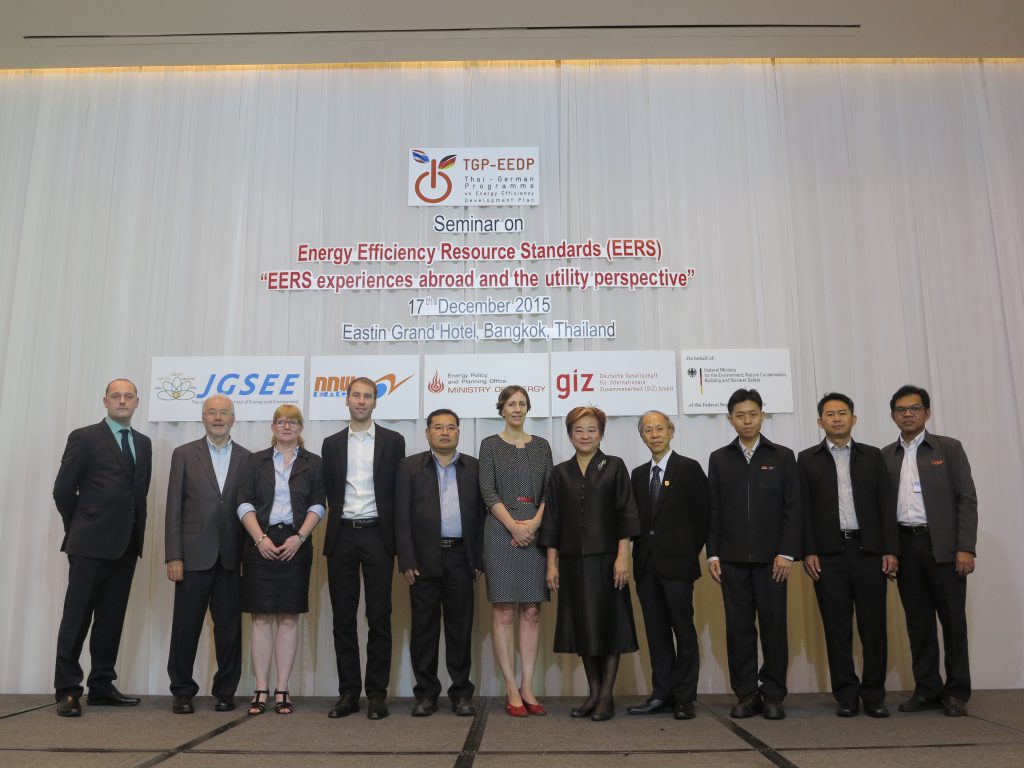On Thursday 17 December 2015, TGP-EEDP in cooperation with Energy Policy and Planning Office (EPPO), Energy Regulatory Commission (ERC) and the Joint Graduate School of Energy and Environment (JGSEE), jointly organized a seminar on Energy Efficiency Resource Standards (EERS) called “EERS experiences abroad and the utility perspective” at EASTIN Grand Sathorn Hotel, Bangkok. The objectives of the seminar are to introduce knowledge and share understanding of EERS measure, as well as emphasize the importance of EERS to the energy conservation in Thailand, also to present international practice and implementation experience from the perspective of the utilities.
In this occasion, Mrs. Em-orn Cheepsumol, Deputy Director-General, EPPO, gave a welcome speech for this seminar.
Background Information: EEDP and EERS
In 2010, the Energy Policy and Planning (EPPO), assigned by the Ministry of Energy, has formulated the long term 20-year Energy Efficiency Development Plan (EEDP) which was updated in 2015 to become Energy Efficiency Plan (EEP 2015), and which aims to reduce energy intensity (energy consumption/GDP) in 2036 by 30% (compared with that in 2010).
Energy Efficiency Resource Standards (EERS) for large energy businesses is listed in the Energy Efficiency Plan as one of the important measures for realising energy savings by introducing obligations for utilities to realise certain energy savings by assisting consumers in the implementation of energy efficiency. It means that large-scale energy businesses, e.g. those in the electricity, oil and natural gas industries will be required to implement energy conservation measures to encourage their customers to reduce energy use by a specified minimum standard (or Energy Efficiency Resource Standards: EERS). Many countries around the world have already implemented EERS schemes on a national or regional level (e.g. UK, France, Italy, Denmark, several US and Australian States and China) but sometimes in different terms basically describing the same type of policy instrument e.g. “Energy Saving Obligation”, “Energy Efficiency Portfolio Standard”, “Energy Efficiency Commitment” or “Energy Supplier/Distributor Obligation”. In order to transfer knowledge and experience about international practices with EERS and especially to hear from utilities abroad about their implementing experiences as obligated parties in an EERS scheme, the TGP-EEDP programme is organising a workshop on EERS, which will be co-hosted by EPPO, ERC and GIZ as well as supporting research institutes- Joint Graduate School of Energy and Environment (JGSEE) of King Mongkut’s University of Technology Thonburi and Wuppertal Institute (WI), Germany.
Documents for download
Agenda Thai
Agenda English
Introduction of TGP-EEDP and objectives of the EERS seminar
1. Introduction and understanding of EERS in the Thai context
2. International practice of utilities with EERS
3. Experience of NGF Nature Energy on EERS in Denmark
4. EERS development and experiences in China and Australia
5. EERS development and experiences of EDF on EERS in UK
